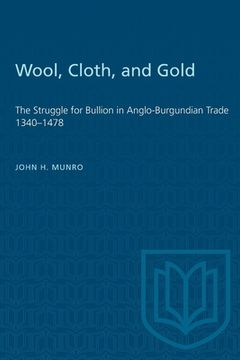Share
Wool, Cloth, and Gold: The Struggle for Bullion in Anglo-Burgundian Trade 1340-1478
John Munro
(Author)
·
University of Toronto Press
· Paperback
Wool, Cloth, and Gold: The Struggle for Bullion in Anglo-Burgundian Trade 1340-1478 - Munro, John
Choose the list to add your product or create one New List
✓ Product added successfully to the Wishlist.
Go to My Wishlists
Origin: U.S.A.
(Import costs included in the price)
It will be shipped from our warehouse between
Thursday, June 13 and
Monday, July 01.
You will receive it anywhere in United Kingdom between 1 and 3 business days after shipment.
Synopsis "Wool, Cloth, and Gold: The Struggle for Bullion in Anglo-Burgundian Trade 1340-1478"
This study in economic history focuses on the commercial relations and monetary policies of England, Burgundy, and Flanders in medieval times. Professor Munro shows how princes in continental Europe employed coinage debasements far more often as ad hoc fiscal measures to meet their ever-growing need for revenue than as purely monetary strategies to serve the economic requirements of their subjects.He demonstrates that the English Parliament had managed to exert such strong controls over the coinage that the Crown was forced to resort to other measures to secure precious metals for the mint' and thus that such bullionist policies adopted by England, especially as they served monetary as well as fiscal needs and in so far as they attempted to produce bullion influxes by regulating the balance of trade, provided the true foundations of those early-modern economic policies and state practices known as Mercantilism. The most lucrative source of potential bullion was England's export of wool, upon which the traditional draperies de luxe of the Burgundian Low Countries were so vitally dependent. He further describes how the competitive mint and bullionist policies severely disrupted the economic relations of these two countries, whose geography, economics, and history had made them so strongly interdependent, and broke up their political alliance at a crucial phase of the Hundred Years' war. The author concludes that the ultimate consequence of this conflict was to accelerate the economic transformations of the countries involved. The draperis de lux of the Low Countries which for centuries had dominated the European markets fell into decay, and the final decisive victory of the English cloth industry and trade launched England on its slow but inexorable voyage toward the Industrial Revolution.
- 0% (0)
- 0% (0)
- 0% (0)
- 0% (0)
- 0% (0)
All books in our catalog are Original.
The book is written in English.
The binding of this edition is Paperback.
✓ Producto agregado correctamente al carro, Ir a Pagar.

